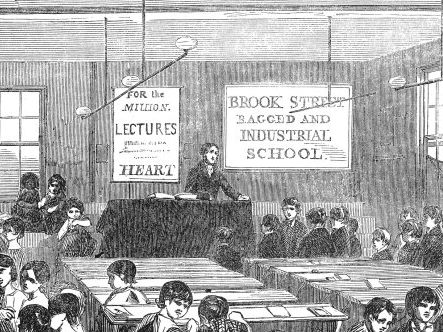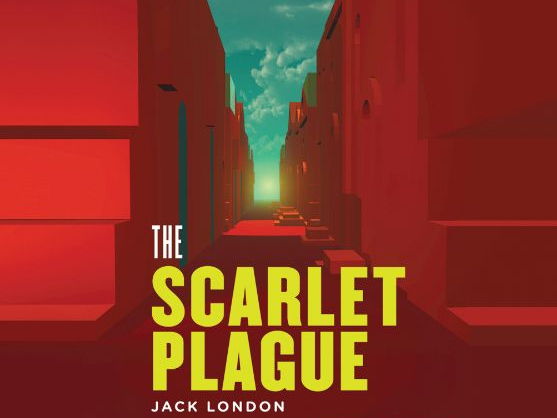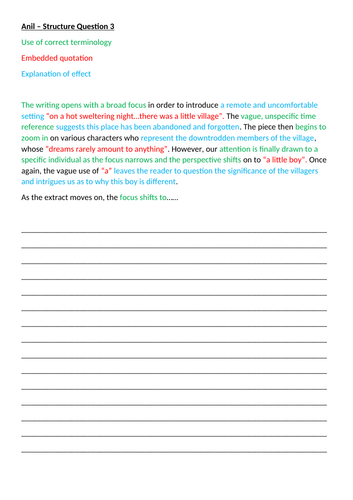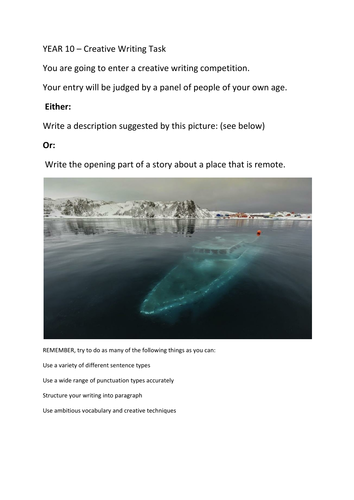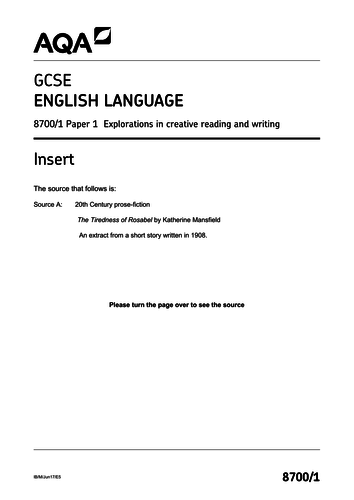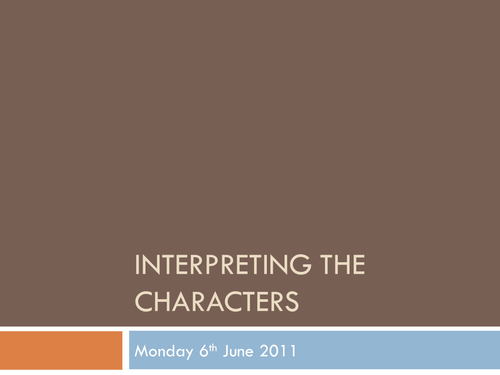
228Uploads
563k+Views
1397k+Downloads
All resources

AQA English Language Paper 2 Deconstruction: The Other Side of the Dale vs The Ragged School
I’ve done quite a few of these now, and I always try to improve on the last one. I think this is about as far as I can go with this format. Here’s what you get:
An individual breakdown of each of the exam questions. Each section contains the following:
A breakdown of the AQA related material
A walk-through for Q2, Q3 and Q4
Suggested targets and strategies
5 Case studies using real student responses (Except for Q1. You’ve got 10 for Q5 though)
Real students planning processes laid out for discussion
It’s a big one - you’ve got 60+ slides to work through. In terms of teaching, this works best after you’ve sat the relevant exam. However, it wouldn’t take much tweaking for a mock-style scenario. Also, this is designed to be given to the students so that they can engage with it at home.

AQA English Language Paper 2: Death Zone vs London Snow
A powerpoint lesson designed to be taught either AFTER a class has sat AQA English Language Specimen Paper 4, or to be used WHILST a class is sitting the same paper in the form of a mock exam where feedback is given immediately.
In this powerpoint, I refer directly to the model material provided by AQA and provide some feedback that can be given to the students. The idea with the feedback is that the person marking (teacher or student) writes down the letter/number and, when the marked work is returned, the owner of the response can either write the target down in full or highlight it in a printed version.

AQA English Language Paper 1: The Mill
A PowerPoint designed to be used after students have sat the Section A of the AQA English Language Paper 1 for June 2019. It wouldn’t take much altering to be used as a mock exam itself. The slides are set up to show the model answers from the mark scheme so that students can peer/self assess and give actions and feedback.

AQA English Language Paper 1: Glass, Bricks and Dust
Two powerpoints, both showing the same thing, but one is designed to be used on a mobile phone (portrait, no animations etc.).
The powerpoint can be used one of two ways. Either it can be used as part of a talking mock exam (where the students talk through a strategy before attempting each task, followed by marking and reflective targets) or as part of getting the students to evaluate their own efforts with a view to setting individual targets.
Model material is included as well as the source itself (along with the appropriate mark scheme).
The only thing this doesn’t “mark” is the AO5 element of Question 5. But everything else is there.

AQA English Language Paper 1 Deconstruction: The Silent Land
Similar to a number of other resources I’ve already posted.
Designed to be used after the students have sat the associated AQA English Language Paper 1 GCSE Paper, though with a little tinkering, you could run this as a mock exam itself and then have the students peer/self-assess afterwards.
The powerpoint goes through each of the five questions, placing a firm expectation on the students having a pre-established strategy for completing each task. The students are then encouraged to refine this strategy. Each of the sections contains a break down of the associated source, exploration of the stepped Model Responses provided by AQA, and then provides the students with up to FIVE Case Study responses written by students (containing mistakes and all).
I’ve had a lot of success with these types of powerpoints and they are especially useful for students working in isolation, or as a revision tool.
Hopefully this will be of use to you.

KS3 Northern Lights Complete Unit of Work (Focus on creative writing)
Numerous lessons (though as you’ll see they can be expanded/contracted as meets your need) surrounding the teaching of Phillip Pullman’s Northern Lights (a quite awesome book) to a Key Stage 3 class. I taught this unit to a top and bottom set and got a lot out of it in terms of enjoyment and successful creative writing.
I will be using it as a starting point for a reading assignment with very little modification.
May your daemon guide you well.
ADDITION: I have adapted the material to be more focused on GCSE Language creative skills, and incorporated material drawn from the BBC series His Dark Materials. The “newer” lessons are aimed for higher ability students and deal with some more specific creative writing issues like dialogue.

AQA English Language Paper 1 Revision lesson: The Scarlet Plague
So my school got a-hold of some exams for purposes of our year 11s sitting mock exams. This is the lesson I am using to teach the little so-and-sos what went wrong and how to fix it. For this lesson to have relevance, you will needed to have had your students sit the actual exam. Saying that, you could probably get away with photocopying the extract and running it as a walking-talking mock (say that's not a bad idea...).
This lesson is simple: it goes through each question in order and identifies some general common errors made in the students' answers, some paraphrased student responses are included as discussion points (just a quick one, when I say that the response comes from an answer that got X amount of marks, I am awarding that mark to a complete answers, not the section I have chosen to show) and finally some specific areas of focus. You have enough for about 4-5 lessons here, depending on how much you focus on the larger questions.
Enjoy.

D6 Dungeons and Dragons: Creative Writing tool kit - let your students' imagination run wild!
I am vexed (greatly vexed) at the generally poor quality of creative writing with students these days - they do tend to have a lot of their thinking done for them. Sadly, it seems to be something that is leeched out of them by a combination of an aggressive curriculum and teenage priorities. So, this is my answer - DUNGEONS and DRAGONS (Or D6 Dungeons and Dragons as I am now calling it).
Simply put, it's a very simplified version of the original Dungeon's and Dragons - you need only a D6 (One dice), pens, paper and this power point to play.
Try it out - I had some huge success with year 8, 9 and 11 classes instead of playing DVDs in the build up to the Christmas Break - it would work just as well for Easter, Summer and stand alone lessons where you have an awkward space to fill.
Use this lesson when you are trying to answer this question - how can I teach kids to be more creative?
There is some initial effort required on your part though - you will have to be the Dungeon Master in the example - but once you've got past this part, I am willing to bet you could leave the room and the kids won't have noticed.
Additionally, I will be creating a series of themed "mission packs" for Christmas, Easter and Summer - you'll have to buy these (they take a while to make), but the start point is yours for free!!!
LINK to Christmas Mission Pack - THE CASTLE OF TERROR!
https://www.tes.com/teaching-resource/d6-dungeons-and-dragons-christmas-mission-pack-the-castle-of-terror-11462671

AQA English Language Paper 2 Section A Resource pack: Jack the Ripper vs Zodiac Killer
A set of resources designed to engage year 11s with English Language Paper 2 Section A. I shaped the lessons around the articles written surrounding the time of Jack the Ripper, and around an article published following the Zodiac Killer sending a letter to the San Fransisco Chronicle.
The class were fascinated by these articles - I had students independently going away and reading pre-19th century newspapers off their own backs! This will need to be taught delicately though - the content is graphic in nature, so be sure that your class has the necessary level of maturity to access this material without being distracted.

Head of Year/College Central Spreadsheet
I designed this spreadsheet to track a bunch of the elements I needed to keep an eye on within the Head of Year role. Remember, hide the columns you don’t need and write comments to keep a fuller track of details. A watered-down version of each area is available to see on the top sheet. Also, you can add/modify the menus The areas are as follows:
CONTACT TRACKER: Designed to keep track of meetings and phone calls from class room teacher all the way up to governors.
TARGET TRACKER: Similar to contact tracker but it allows for you to track a set of targets. I’d log the target in a comment and then enter a new target should I need to do so.
OUTSIDE AGENCIES TRACKER: The original reason I set the spreadsheet up. Allows for you to see who has interactions with an agency (e.g. Early Help) and track your contact with them.
BULLYING/INCIDENT TRACKER: Accounts for identification of incident, investigation and follow up. You can then log the action.
TOILET/TIME OUT PASS TRACKER: Allows for you to monitor when a pass was set up and keep a check of how frequent it is used.
You’ll need to copy some of the sections to expand. Not a spreadsheet for the faint hearted, but you’ll only ever need THIS spreadsheet.
EDIT: Hello. I’ve included an updated version of this spreadsheet. I’ve used it over the year and, whilst I have found it to be REALLY useful, there were some issues with ordering things and the information becoming corrupt. So, I’ve made a new one that uses the students admission numbers as a starting point. The spreadsheet offers the same features as the one above, but with the following additions:
YEAR TRACKER: Tells you clearly how many FSM, PP, Early Help, CIN and many other categories of students you have in one go.
PASTORAL TRACKER: Allows you to track form issues, social issues and a variety of other elements. My intention is to make the spreadsheet available to my Year Team so they can check in on the status of their form members.
More importantly, you can re-order things and it won’t screw up the data.
The spreadsheet is designed to import information from Bromcom on the initial entry page, but it’s easy enough to fill in using other starting points.

KS3: Escape from Kraznir creative writing pack (my version)
First things first, let me just say that the mind that created the Escape from Kraznir SoW was not mine - wish it was though…
You are not buying the SoW (though I do include it as part of the pack so you have a frame of reference), that is available freely elsewhere. What you are buying is the 7 lessons that I created from this SoW and taught to my students. Let me say this - I have never had such a reaction creatively.
My gast was well and truly flabbered as to their engagement and the effort they put in.
I’ve created a single power point that contains all of the other lessons too - just for those who like continuity.
NOTE: I used some of the sound effects from Warcraft 2, but I couldn’t put this up here (Blizzard may have something to say about that). However, you can use your own sound effects and music as and where you see fit (I liked using the Death of Optimus Prime Music from the Transformers Movie (not the Bay versions, the original cartoon version with Unicron) over the top of the farewell aspect in Lesson 2).
This is a lot of fun.
I promise.
Seriously…
PS: If you enjoyed this scheme of work, you might be interested in the follow up unit:
https://www.tes.com/teaching-resource/ks3-fantasy-creative-writing-the-return-to-kraznir-12373343

AQA: Year 9 Intro to English Language Paper 1 + Workbook
A variation on a selection of lessons that I sell elsewhere. Here, the center piece is a 26 page printable workbook that runs in tandem with the power-point lessons - ideal for a Summer Term 2 unit of work where you are reluctant to give the students a new work book, and working on paper is problematic.
The text is Anil (from the old Sunlight on the Grass Anthology) and there is about 12 lessons worth of material here.

KS3: SPaG Understanding a Text Lessons (Using Michael Grant's "Gone" series as a stimulus)
SPAG lessons can get a little flat at times. These are the worksheets I’ve designed to use with my own SPAG group. It is designed to be taught in tandem with a Dystopian Fiction SoW that ends with a reading assessment. Specifically, these lessons focus on an extract taken from Michael Grant’s “Gone” - all extracts taken from the first chapter. The aim is to develop an increased understanding of each text through the asking of more and more complex questions. The tasks can be sat as part of a lesson (I reckon they’ll take most groups between 10-30 minutes depending on the groups setting), or make ideal homework and/or extension tasks.
At the moment, the resources are set up to be taught to lower set year 7 students. But, it won’t be too hard to change the tasks to more suitable ones for any set.
UPDATE: I’ve included some versions that are more suited to be printed out. They have some basic RAG feedback grids on the back with some generic targets.

AQA English Language Paper 1: Brighton Rock
A deconstruction of the English Language Paper 1 examination that uses Brighton Rock as a source. I’ve lifted the model material from the mark schemes and there’s FAR related targets included. Essentially, this is a lesson that can be taught either AFTER the students have sat the exam and you want them to peer/self assess, or you could change it so that that they answer a question and then mark their efforts.
The Section B element is a bit of an experiment - peer marking creative writing is always a challenge. So I’ve given the students a series of yes/not/some related questions. The idea is that they “tick” the level next to the answer on a copy of the AO5 and AO6 mark schemes. Using that, they should be better able to work out where the creative writing fits. My peer marked creative writing has got much more accurate as a result of this.

AQA GCSE English Language Paper 1 Style Creative Writing Tasks
Three quick and easy tasks with supporting images. Ideal for quick and easy filler lesson, or as building into a larger scheme.

KS3: Woman In Black: Creative Writing focus
Taught as part of a two teacher approach to a top set year 9 class. I focused on developing creative writing skills, with a particular emphasis on the structural components, whilst my partner teacher focused on the more traditional literature style approach.
The Woman In Black was used as the stimulus for all elements of this unit and the climax is a GCSE English Language Paper 1 style task (not included in this pack as it is part of my school’s assessment pack).
Overall, I found this unit to be really useful in challenging students to think about their creative writing in more than just a reactionary way. The nature of the structure focused questions align with my belief that it is always better to teach the Language Paper 1 Q3 question in the form of a structure-focused creative writing commentary at KS3 level. Hopefully this will provide you with a useful starting point for your own creative writing journey.

AQA English Language Paper 2 Deconstruction: The Crossing vs. Idle Days in Patagonia
This resource was designed to be used after a class or cohort have sat the 2019 English Language paper 2. It’s set up to be used after a class has sat the exam and had their papers marked, but it wouldn’t take much modification to be used as part of a scenario where the students get the material, execute a preparatory strategy, answer the question and then peer/self mark.
The material from the AQA mark scheme has been integrated into the PowerPoint, so students can get a sense of what level their response is before fine marking. I’ve done a few in this style and the students value them as revision tools too.

AQA English Language Paper 1: The Tiredness of Rosabel exam deconstruction
A lesson designed to be taught AFTER the class has sat a mock exam. However, with very little modifcation this can become a walking-talking mock exam, or a peer/self assessment based lesson.
The powerpoint contains model material and an indicator as to the quality of the model material. My class found this lesson to be very useful.
Additionally, the insert is available for free should you wish to download it for yourself. I include the link below:
https://linwood.bournemouth.sch.uk/summerwood/files/2017/12/8700_1-INS-EnglishLanguage-G-6Jun17-AM.pdf

Twelfth Night: Interpreting Characters Powerpoint
A complete powerpoint lesson exploring the way in which students can interpret the characterisation evident in Twelfth Night by William Shakespeare.

Title, Blurb and brief description
A starter activity to get students involved in different types of fiction. You will need to cut out each of the constituent parts, but this is a great starter activity with the kids working together to match them up.

